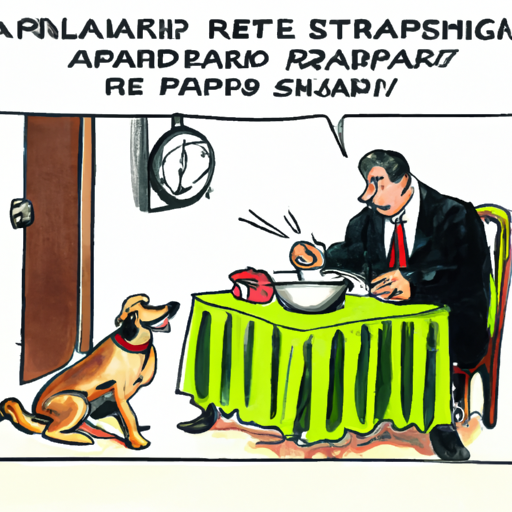As dog owners, we often find ourselves perplexed by our dogs’ strange behavior. One such behavior that often raises eyebrows is when our furry friends eat their food as if they’re in a race. You might find yourself asking, “Why do dogs eat fast?” In this comprehensive guide, we delve into the reasons behind this behavior and provide tips on how you can help your dog enjoy their meals at a more leisurely pace.
Table of Contents
- Understanding a Dog’s Eating Habits
- Reasons for Fast Eating
- Dangers of Fast Eating
- Tips to Slow Down Your Dog’s Eating
- Frequently Asked Questions
Key Takeaways
- Dogs eat fast due to several reasons, including competition, survival instincts, and even medical conditions.
- Rapid eating can lead to various health issues, such as choking, gastrointestinal problems, and a life-threatening condition known as Gastric Dilatation-Volvulus (GDV).
- Using specially designed dog bowls, serving smaller meals throughout the day, and creating an environment free from distractions are some ways to slow down your dog’s eating.
- Always consult with a veterinarian if your dog’s fast eating is coupled with other concerning symptoms.
Understanding a Dog’s Eating Habits
Before we delve into why dogs eat fast, it’s important to understand their eating habits. Dogs, especially those in the wild, are naturally predisposed to eat quickly. This is primarily due to their survival instincts and competition from other animals. In a domestic setting, these instincts may still be present. However, other factors may contribute to their rapid eating habits.
Reasons for Fast Eating
Competition
Dogs are pack animals. In the wild, they had to compete with other dogs and animals for food. Even though your furry friend now has a guaranteed meal, the instinct to compete for food may still be ingrained in them. This is particularly common in multi-pet households where one animal may feel the need to finish their food quickly so others can’t get to it, a phenomenon that OneTopDog refers to as ‘resource guarding’.
Survival Instincts
Your dog’s ancestors didn’t know where their next meal was coming from. As a result, they developed the habit of eating quickly to consume as much food as possible when it was available. While your dog has a steady food supply, this survival instinct may still be present.
Medical Conditions
In some cases, rapid eating may be a sign of an underlying medical condition. For instance, dogs with diabetes or thyroid issues may eat quickly due to increased hunger. If your dog’s fast eating is accompanied by other symptoms, it’s best to consult with a veterinarian.
Dangers of Fast Eating
Fast eating can lead to a host of health issues. Here are a few to be aware of:
-
Choking: Dogs who eat too quickly are more likely to choke on their food, as they might not be chewing their food properly.
-
Gastrointestinal Problems: Rapid eating can cause indigestion, bloating, and vomiting.
-
Gastric Dilatation-Volvulus (GDV): Also known as ‘bloat’, this is a severe condition where a dog’s stomach fills with gas and possibly twists, blocking blood flow. It requires immediate veterinary attention.
Tips to Slow Down Your Dog’s Eating
If your dog is a fast eater, don’t worry. Here are some practical tips to help them slow down:
-
Use a Slow Feeder Bowl: These specially designed bowls have ridges and mazes that make your dog work a little harder for their food, thereby slowing down their eating.
-
Serve Smaller, More Frequent Meals: Instead of two large meals, consider giving your dog smaller meals throughout the day.
-
Create a Calm Environment: Reducing distractions and competition can help your dog feel less rushed during meal times.
Remember, it’s always best to consult with a professional if you’re concerned about your dog’s eating habits. OneTopDog has a wealth of information on dog feeding tips and best practices.
Frequently Asked Questions
Q: Why is my dog eating so fast all of a sudden?
A: Sudden changes in your dog’s eating habits could be due to stress, changes in their environment, or an underlying medical condition. It’s best to consult with a veterinarian.
Q: Can fast eating cause my dog to vomit?
A: Yes, rapid eating can lead to vomiting as it may cause indigestion or bloating. If your dog is vomiting frequently, it’s essential to seek veterinary care.
Q: How can I get my dog to chew his food?
A: Using a slow feeder bowl or large, chunky kibble can encourage your dog to chew their food more. Always ensure the food pieces are size-appropriate to prevent choking.
In conclusion, while dogs eating fast may seem strange to us, it’s often a natural behavior for them. However, as responsible pet owners, it’s crucial to monitor this behavior and intervene if it poses health risks. For further reading, check out OneTopDog’s comprehensive guide on dog nutrition.



